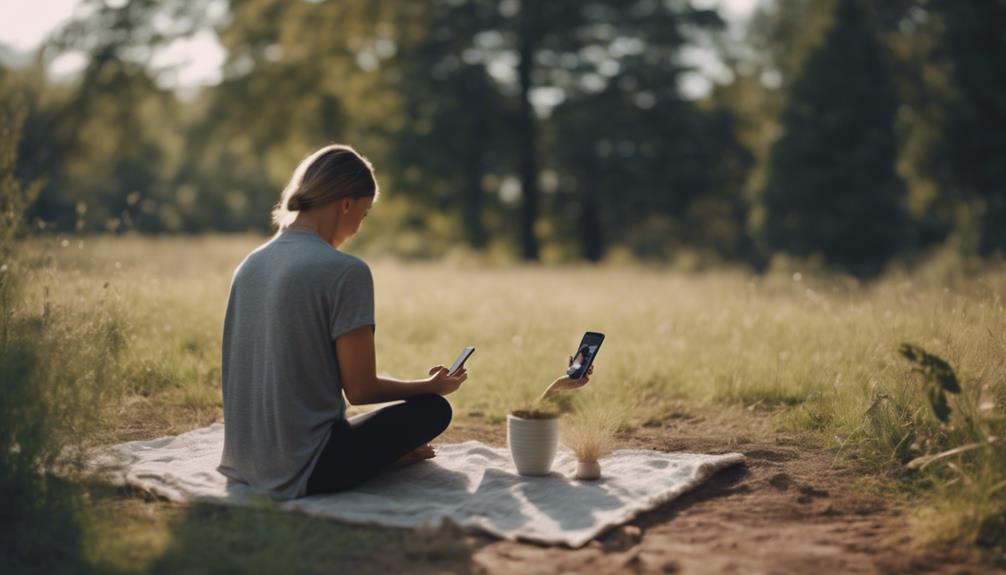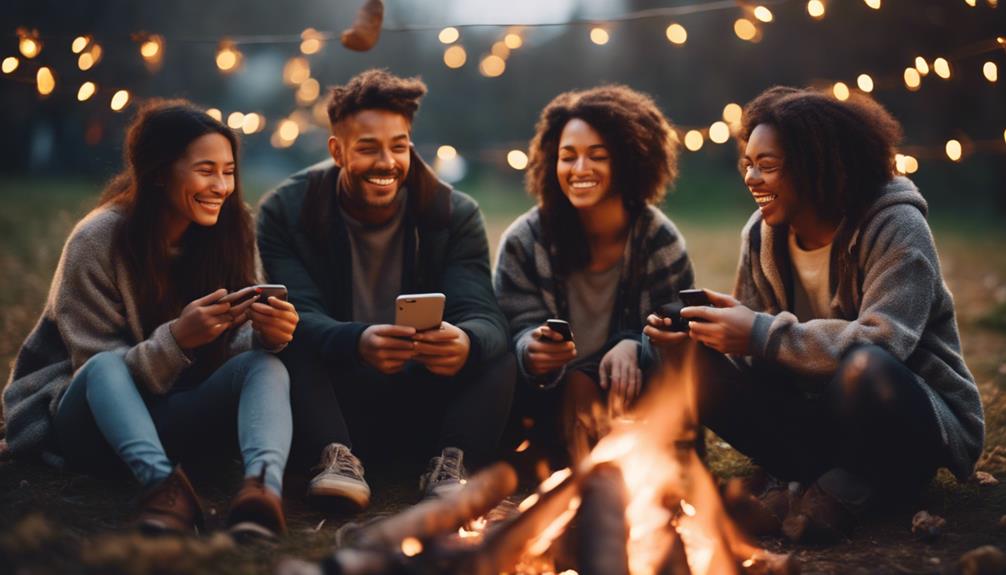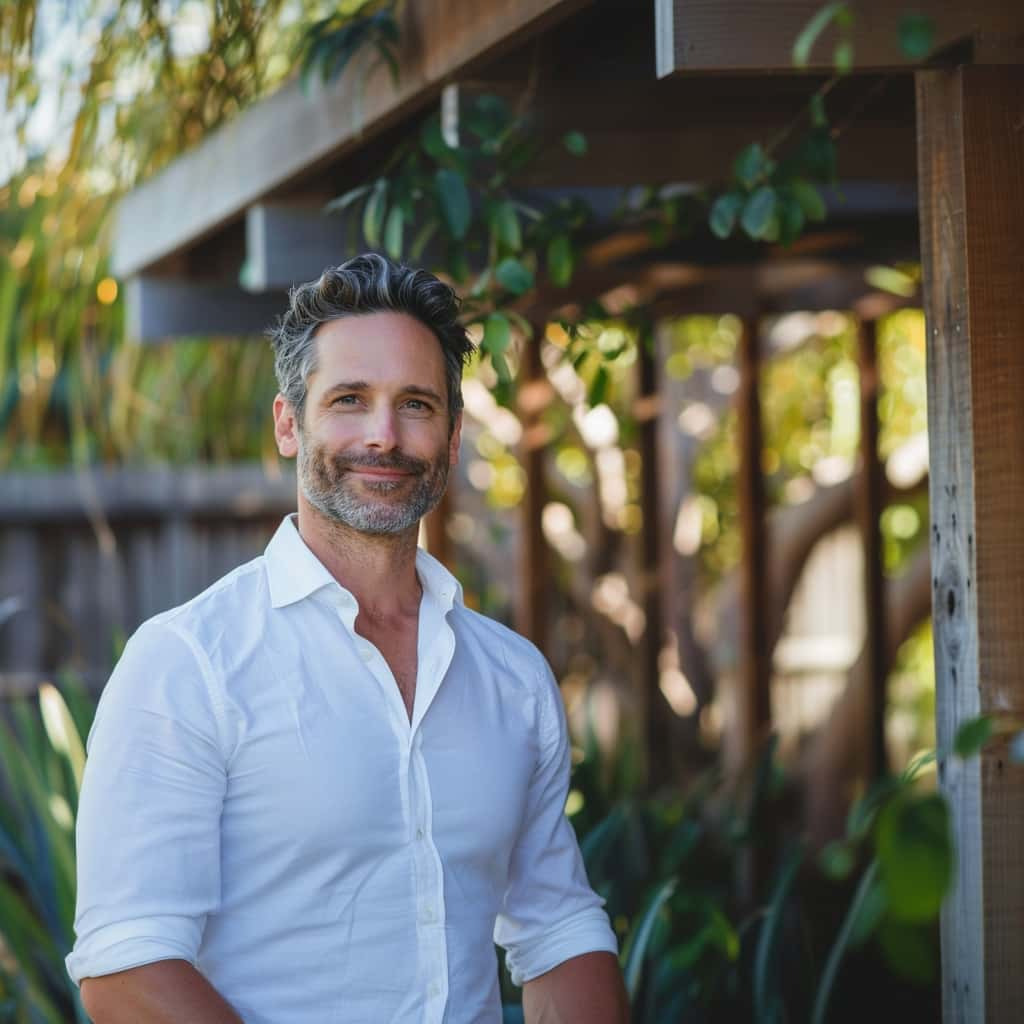In today’s digital age, influencers and their followers are adopting digital detoxes to prioritize mental well-being. Social media detox movements and mindful practices like meditation are becoming more popular. Influencers promote the use of technology mindfully to enhance brand trust. The benefits include increased focus, reduced stress, and improved sleep patterns. Face-to-face interactions strengthen relationships, with live events reinforcing brand loyalty and trust. Activities without screens help boost creativity and problem-solving abilities. Digital detox efforts are impactful, resonating with over 80% of influencers’ audiences. By striking a balance between online and offline experiences, individuals can develop healthier relationships with technology. Learn more about this transformative change.
Key Takeaways
- Influencers collaborate with wellness brands to promote mindful technology use.
- Audiences benefit from improved focus, productivity, and mental well-being post-detox.
- Advocacy for disconnecting from technology fosters mental well-being.
- Audience resonance with digital detox content exceeds 80%.
- Digital detox initiatives increase consumer trust in brands.
The Shift Towards Offline Engagement
With the rise of digital overload in today's society, there's a noticeable shift towards offline engagement for enhancing trust and brand perception. Companies are realizing the importance of face-to-face interactions in building relationships with consumers and improving brand trust.
The Freeman Trust Report 2023 reveals a 77% increase in brand trust following personal interactions, emphasizing the significance of offline engagement.
Local venues such as Harmony Café and Trees Organic Coffee exemplify the success of hosting live community events to foster connections with customers. These events not only enhance trust but also create a sense of belonging and loyalty among attendees.
Businesses are increasingly using offline events as a strategy to establish themselves as community hubs, boosting visibility and customer engagement.
Moreover, real-time feedback obtained from in-person interactions allows companies to make immediate adjustments and address concerns effectively. By prioritizing offline engagement, businesses can strengthen their brand perception and build lasting relationships with their audience.
Mindful Practices for Digital Balance

The current trend towards mindful practices for digital balance highlights the growing importance of prioritizing mental well-being and creativity amidst increasing screen time. Research indicates that incorporating mindfulness techniques such as meditation and setting boundaries for tech-free time can greatly benefit mental well-being and enhance creativity.
As individuals seek ways to combat the negative effects of excessive screen time, mindful practices like prioritizing offline experiences are gaining popularity. Social media detox movements are on the rise, reflecting a shift towards more intentional and mindful technology use.
Embracing digital wellness through promoting digital mindfulness and responsible technology habits has become essential in today's digital age. Strategies for achieving a successful digital detox include setting clear boundaries, replacing digital habits with offline activities, and seeking support from friends and family.
Influencers Leading Unplugged Movements

Influencers are at the forefront of leading unplugged movements, advocating for the benefits of disconnecting from technology.
By sharing personal stories and experiences, these influencers are actively engaging their audiences in the journey towards digital detox.
Collaborations between influencers and wellness brands further amplify the message of mindful technology use, encouraging followers to prioritize offline experiences for a healthier balance.
Influencer Impact on Detox
Prominent figures in the digital sphere are spearheading the unplug movement by championing digital detoxes and encouraging their followers to disconnect from technology. Influencers play a crucial role in promoting awareness about the importance of taking breaks from constant connectivity on social media platforms. By sharing their own experiences with mental health benefits gained from unplugging, influencers inspire their audience to prioritize offline interactions and mindfulness.
Additionally, influencers are collaborating with brands that advocate for digital wellness, endorsing products and services aligned with the concept of unplugging. The impact of influencers on detox initiatives is tangible as seen through the increasing interest and engagement from their followers. Through dedicated content promoting balance and self-care, influencers are fostering a culture of conscious technology use.
Audience Participation in Unplugging
Participating actively in influencer-led unplugged movements, audiences are increasingly embracing digital detoxes to prioritize offline experiences and mindfulness. Influencers play a pivotal role in spearheading digital detox movements, urging their followers to disconnect from the virtual world and reconnect with the present moment. By sharing personal stories of their own digital detox journeys, influencers inspire their audiences to seek a healthier balance between online and offline activities, fostering a sense of mindfulness and overall wellness.
Audience participation in these initiatives is on the rise, reflecting a growing awareness of the detrimental effects of excessive screen time on mental well-being. Collaborations between influencers and brands on digital detox campaigns further emphasize the importance of unplugging for improved quality of life.
The surge in influencer-led unplugged challenges underscores the shift towards prioritizing real-world experiences over digital distractions, encouraging individuals to take active steps towards a more mindful and balanced lifestyle.
Benefits of Digital Detox for Audiences

Research indicates that digital detoxes offer audiences a range of benefits, including improved focus and productivity.
Participants often report enhanced mental well-being, with reduced stress and anxiety levels.
Disconnecting from screens can lead to a heightened sense of present moment awareness, fostering a more fulfilling and balanced lifestyle.
Improved Focus and Productivity
Enhancing focus and productivity through digital detoxes can greatly benefit audiences by reducing distractions and improving attention span. Disconnecting from screens allows individuals to regain mental clarity and concentrate more effectively on tasks.
Research indicates that taking a break from digital devices can lead to increased productivity levels by minimizing exposure to constant notifications and information overload. This improved focus post-detox enables audiences to engage more deeply in activities, resulting in higher quality outcomes and achievements.
By experiencing enhanced cognitive function and mental sharpness after a digital detox, individuals can contribute to their overall productivity. Studies emphasize the importance of incorporating regular breaks from technology to optimize focus and productivity levels among audiences.
As influencers and audiences continue to embrace digital detoxes, the positive impact on attention span and task performance becomes more apparent, highlighting the value of disconnecting to enhance productivity.
Enhanced Mental Well-Being
Disconnecting from screens and social media during a digital detox can lead to a significant reduction in stress and anxiety levels, improving mental well-being for audiences. Studies have shown that taking breaks from technology promotes better sleep patterns and overall mental health.
Engaging in offline activities during a digital detox can strengthen social connections, reducing feelings of isolation. Additionally, regular digital detoxes can help individuals manage their emotions and maintain a positive mood. By disconnecting from the constant digital noise, audiences can experience a sense of calm and mental clarity, allowing them to focus on their well-being and relationships.
This shift towards prioritizing offline interactions over online distractions not only benefits mental health but also fosters a deeper connection with oneself and others. Influencers and audiences alike are recognizing the importance of balancing screen time with real-life experiences to enhance their overall mental well-being.
Redefining Online Habits

As individuals increasingly prioritize offline experiences, they're actively reshaping their online habits to achieve a healthier balance in their digital lives. In the current digital age, where screens dominate our daily routines, the shift towards incorporating more offline activities signifies a conscious effort to enhance mental well-being and overall quality of life.
Influencers have been instrumental in promoting digital detox initiatives, with a 72% increase in participation observed among both influencers and their audiences. Research has shown that taking a break from screens can lead to a significant 20% increase in mental well-being and productivity, highlighting the importance of reevaluating our digital strategies.
Moreover, over 80% of influencers believe that including digital detox content resonates well with their audience, resulting in boosted engagement levels. Brands leveraging influencer marketing to advocate for digital detoxes have experienced a notable 35% increase in consumer trust and loyalty. This redefinition of online habits reflects a growing awareness of the need to strike a balance between the digital world and real-life experiences.
Real-Life Connections Over Screens

Real-life interactions foster stronger connections and trust compared to digital engagements. When individuals engage offline, whether through face-to-face interactions or live events, a deeper level of brand trust is established. This is evident in the 77% increase in brand trust observed after personal interactions take place.
Local businesses like Harmony Café and Trees Organic Coffee have successfully capitalized on hosting live events, showcasing the power of real-life connections in building customer trust and loyalty. Face-to-face interactions not only deepen relationships with consumers but also provide valuable real-time feedback that can greatly impact brand perception.
Live events, such as community gatherings and direct engagements, create memorable moments that go beyond what digital interactions can achieve, solidifying customer trust and brand loyalty in a way that online interactions often struggle to match.
Encouraging Offline Interactions

Encouraging face-to-face interactions and live events in the community can greatly enhance brand trust and loyalty according to recent studies. Offline interactions have been shown to notably increase brand trust, with a 77% rise in trust post personal interactions, as highlighted in the Freeman Trust Report 2023.
Live events and community engagements play a pivotal role in deepening relationships with consumers. They provide opportunities for real-time feedback and foster customer loyalty. Businesses like Harmony Café and Trees Organic Coffee have successfully leveraged live events to create community hubs that not only enhance visibility but also attract customers through meaningful interactions.
To promote such events effectively, businesses must possess SEO knowledge to maximize online presence for offline activities, ensuring a thorough approach to engagement. Implementing strategies like hosting local events, offering workshops, and collaborating with local artists can further enhance brand reputation and foster emotional connections with consumers, solidifying loyalty in the long run.
Embracing Screen-Free Activities

Engaging in screen-free activities has been increasingly recognized as a beneficial practice for improving mental well-being and overall health. Embracing offline hobbies and exercises can have a profound impact on individuals seeking mindfulness and balance in their lives. Here are three ways screen-free activities contribute to enhancing mental well-being:
- Promoting Creativity: By disconnecting from screens, individuals can tap into their creative potential, allowing for new ideas to flourish and innovative thinking to thrive.
- Boosting Focus: Screen-free activities enable individuals to concentrate better on tasks at hand, leading to increased productivity and a sense of accomplishment.
- Enhancing Cognitive Function: Engaging in offline pursuits can sharpen cognitive abilities, such as problem-solving skills and memory retention, fostering mental agility and resilience.
Prioritizing Mental Well-Being

Prioritizing mental well-being by incorporating digital detoxes into one's routine is essential for fostering a healthy balance in today's technology-driven world. Studies have demonstrated that taking intentional breaks from screens can lead to improved focus and productivity.
By engaging in offline activities as part of a digital detox, individuals can strengthen social connections, reduce feelings of FOMO (fear of missing out), and enhance their overall well-being. The increasing popularity of the digital detox movement among influencers and the general public signifies a growing recognition of the significance of mental wellness in the digital age.
Setting clear boundaries and goals for a digital detox is vital in maintaining mental wellness and achieving balance. Brands and influencers advocating for digital detoxes are encouraging audiences to prioritize self-care and mindfulness in their daily lives. By promoting these practices, individuals are empowered to make conscious choices about their technology usage, leading to a healthier relationship with digital devices and a more positive impact on their mental health.
Frequently Asked Questions
What Is the Importance of Digital Detox?
Digital detoxes are essential for mental well-being. Studies show they improve focus, productivity, and reduce anxiety levels.
Setting boundaries with technology promotes a healthier lifestyle, enhancing social connections and relationships. Regular breaks combat the fear of missing out (FOMO) and boost overall happiness.
Disconnecting from screens is linked to improved sleep quality and reduced isolation. These benefits highlight the importance of digital detoxes for individuals seeking a balanced and fulfilling life.
How Many People Do Digital Detox?
Research indicates that a significant portion of the population has engaged in digital detoxes. A survey found that 52% of adults in the US have taken breaks from social media in the past year. Furthermore, 59% of Gen Z and millennials also opt for social media breaks to enhance their mental health.
Additionally, 40% of individuals who've undergone digital detoxes reported feeling more productive and focused afterward. This highlights the positive impact of such practices.
What Are the Conclusion of Digital Detox?
Research indicates that the conclusions of digital detoxes are positive, with improved well-being and focus being key outcomes.
A recent study by the American Psychological Association found that 65% of individuals reported feeling less stressed after engaging in a digital detox.
This highlights the tangible benefits of disconnecting from technology and emphasizes the importance of incorporating periodic breaks to maintain a healthy balance in the digital age.
What Are the Theories About Social Media Detox?
Social media detox theories propose that excessive screen time contributes to heightened stress and anxiety levels. Research indicates that taking breaks from social media can enhance mental well-being and foster creativity. This trend reflects a consumer shift towards valuing offline experiences.
Emphasizing the importance of setting boundaries with technology, these theories advocate for better overall health. Mindfulness practices, such as meditation and tech-free time, are recommended strategies for digital detoxification.
Conclusion
In a surprising turn of events, influencers and audiences are actively embracing digital detoxes to prioritize mental well-being and reconnect with real-life interactions. Many influencers are sharing their experiences with taking a break from social media and the positive impact it has had on their mental health. This trend is also being reflected in the entertainment industry, with celebrities and public figures speaking out about the importance of unplugging and taking time away from screens. In fact, dory’s voice actor recently spoke about the benefits of digital detoxes and how it has allowed her to focus on meaningful, in-person connections.
Despite the allure of screens, the shift towards offline engagement highlights the importance of balance in our increasingly digital world.
As influencers lead unplugged movements and audiences seek mindful practices, the irony lies in the fact that disconnecting from technology is actually bringing people closer together in meaningful ways.










